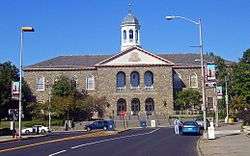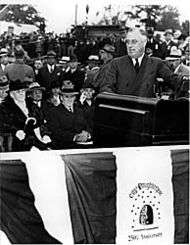United States Post Office (Poughkeepsie, New York)
|
U.S. Post Office | |
 | |
|
Post office viewed looking north on Market Street, 2007 | |
| Location | Poughkeepsie, NY |
|---|---|
| Coordinates | 41°42′21″N 73°55′40″W / 41.70583°N 73.92778°WCoordinates: 41°42′21″N 73°55′40″W / 41.70583°N 73.92778°W |
| Built | 1937-39 |
| Architect | Gerald Foster, Eric Kebbon |
| Architectural style | Colonial Revival |
| MPS | US Post Offices in New York State, 1858-1943, TR |
| NRHP Reference # | 88002413 |
| Added to NRHP | 1989 |
The main U.S. Post Office, Poughkeepsie, New York, USA, is located at the intersection of Market and Mansion Streets downtown (actual address is 55 Mansion Street). The Post Office serves the 12601 ZIP Code, which covers the city of Poughkeepsie, New York and portions of the Town of Poughkeepsie adjacent to the city. It employs a hundred people and handles 300,000 pieces of mail a day and 10 million a year.[1]
History
The building was the second of five post offices in Dutchess County built during the New Deal by the Works Progress Administration. It was the first for which President Franklin D. Roosevelt, a native of Hyde Park, took a close personal interest in the design. He had written in 1928 of his desire to preserve the stone buildings in the Hudson Valley built by early Dutch settlers of the region, including his ancestors, which he feared was disappearing. The simple and modest style of the stone houses built by all those early settlers regardless of wealth was, to him, an example that should be followed by everyone.[2]
Earlier in the decade, nearby Beacon had gotten a new post office in local fieldstone designed by Gilbert Stanley Underwood. When Poughkeepsie's turn came, Treasury Secretary Henry Morgenthau demanded that it be made of irregular fieldstone in the Dutch style, modeled after a demolished county courthouse that had been built in 1809. Architect Eric Kebbon followed the design but originally turned in a building that was to use granite. Roosevelt personally ordered him to redesign it to his specifications and would not let construction proceed until it was.[3]

Roosevelt laid the cornerstone himself at a dedication ceremony during celebrations of the 250th anniversary of Poughkeepsie's settlement on October 13, 1937. Five hundred workers would spend the next two years building the 63,000-square foot (5,670 m²) structure.[1]
The final building included a lobby with murals painted by WPA artists depicting six scenes in local and state history, including the ratification of the United States Constitution by New York.[4] The success of its design inspired Roosevelt to push for similar stone post office buildings in other Dutchess County towns along the river, and it influenced the similar design of new offices built nearby for the Poughkeepsie Journal newspaper. The Smithsonian Institution chose it as one of ten New York post offices among the five hundred most beautiful in the country.[1] It has been on the National Register of Historic Places since 1989.
On October 22, 2008, the cupola, undergoing renovation at the time, was damaged by a fire, causing the building to be closed for a few days. The rest of the building remained undamaged. City fire investigators said the likely cause was accidental, from heat guns used by the painters working on it.[5]
See also
Other Hudson Valley post offices whose design Roosevelt influenced:
- Ellenville
- Hyde Park
- Rhinebeck
- Wappingers Falls (Now used as a municipal building)
References
- 1 2 3 Desai, Jay (1996). ""The Deal That Keeps On Giving: Hudson Valley New Deal Projects Still on the Job"". Building America: Franklin Delano Roosevelt's New Deal. Marist College, The 1996 Summer Scholars. Archived from the original on 2006-10-20.
- ↑ ""FDR and Dutchess County Stone Buildings"". p. 3. Retrieved 2007-11-11.
- ↑ ""FDR and Dutchess County Stone Buildings"". p. 6. Retrieved 2007-11-11.
- ↑ "Dutchess County Tourism — Historic Sites and Museums". Retrieved 2007-11-11.
- ↑ "Fire at post office probably caused by heat guns, wind". Poughkeepsie Journal (Gannett Co.). 2008-10-22. Retrieved 2008-10-22.
| ||||||||||||||||||||||||||